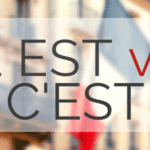
Learning how to ask questions is a vital grammar skill to acquire, especially if you plan on traveling to a French-speaking country. You will likely be asking questions of various people much more often than you will be supplying information to them. If you are staying at a hotel, the desk clerk will probably speak at least some English (unless you are staying in a small town or one not frequented by tourists), but what about ordering lunch at a small cafe or buying tickets to a museum?
No matter what your skill level is, it will be useful to have a good command of the most common question structures and vocabulary. Below we provide a comprehensive review of what you need to know about interrogatives in French.
Interrogative Adverbs
These adverbs are what most people think of traditionally when they think of forming questions. They often start sentences, though they can also be inserted almost anywhere within a sentence, as well.
| Interrogative Adverbs | |
| Quoi | What |
| Qui | Who/Whom |
| Comment | How |
| Pourquoi | Why |
| Quand | When |
| Combien | How much |
| Où | Where |
Many of these words are used very similarly to how they are used in English. For example:
“Where do you live?”→ Où habitez-vous?
“Why are you here?” → Pourquoi es-tu ici?
When placed in front of the est-ce que question formation, quoi becomes qu’.
Qu’est-ce que vous faites? (“What are you doing?”)
Note that qui does not become qu’ before est-ce que, because then you would not be able to tell which of the two words (quoi or qui) the shortened form was referring to.
Qui est-ce que tu aimes? (“Whom do you like?”)
Interrogative Adjectives
Broadly, interrogative adjectives mean “which” or “what” noun one is referring to. They agree with the gender and number of the noun, just as other adjectives do. Their four forms are below.
| Singular | Plural | |
| Masculine | quel | quels |
| Feminine | quelle | quelles |
For example:
Quelle heure est-il? (“What time is it?”)
À quelle heure… (“At what time…”)
Quel jour… (“What day…”)
Quel (and its variants) can also be used as a subject instead of as an adjective when the verb of the sentence is être. It means “which” or “what”.
Quelle est la date? (“What is the date?”)
Quels sont vos plans futurs? (“What are your future plans?”)
Variable Interrogative Pronouns
Just as normal subject pronouns have a gender and number, so do the variable interrogative pronouns. They are used in French in almost exactly the same way as in English, except that there are four forms of each pronoun for each of the four combinations of gender and number.
Lequel, Laquelle, Lesquels, Lesquelles
To ask the question “which” or “which one” of a group of nouns given multiple options for that noun, a variant of the quel structure is used: lequel and its variants.
Lesquels de ces livres préférez-vous? (“Which of these books do you prefer?”)
Or with context that the relevant topic of conversation is livres: Lesquels préférez-vous? (“Which ones do you prefer?”)
Compare this sentence to a similar one using quel:
Quels livres préférez-vous? (“Which books do you prefer?”)
Note the subtle difference in using quel versus lequel. Quel is an adjective. It refers to a specific noun (in this case, livres), while lequel is a pronoun. It can be (and often is) the subject of a sentence.
Other Variants: Duquel and Auquel
There are two pronoun variants on the lequel structure that are capable of being used in questions but usually are not, so we will only mention them briefly here for the sake of completeness.
These pronouns would apply to phrases translated as “to/at which” or “from which”, such as “the town to which I moved” or “the college from which I graduated”.
Their forms look very similar to the normal lequel forms, just with new prefixes added.
Duquel and Variants
| Singular | Plural | |
| Masculine | duquel | desquels |
| Feminine | de laquelle | desquelles |
Auquel and Variants
| Singular | Plural | |
| Masculine | auquel | auxquels |
| Feminine | à laquelle | auxquelles |
For example:
La ville à laquelle j’ai déménagé est petite. (“The town to which I moved is small.”)
Il y a un grand jardin, au centre duquel poussent beaucoup de fleurs. (“There is a big garden, in the center of which grow many flowers.”)
Note that in these structures you also have to be aware that the prepositions that follow certain verbs aren’t necessarily the same in French as they are in English. (For example, in English you think of something, but in French the structure is penser à.)
Forming Questions
There are several ways to structure questions in French. In addition to just using intonation to raise the pitch of your voice at the end of a sentence, just like in English, there are also the options of using est-ce que and inverting subject-verb order.
Est-ce que formation
There is no need to remember a new formation for this structure. Just add est-ce que to the front of the sentence and construct the rest of the sentence as if you were making a statement.
Est-ce que les médecins sont intelligents? (“Are doctors intelligent?”)
Est-ce que ton chien est mignon? (“Is your dog cute?”)
If est-ce que is followed by a vowel sound, it becomes est-ce qu’.
Est-ce qu’elle chante? (“Does she sing?”)
Inversion with pronouns as subjects
Inversion means switching subject-verb order to form a question, in the same way you would in English, so that the verb precedes the subject.
For example, in English the statement:
“They are going to buy us tickets.”
Would become the question:
“Are they going to buy us tickets?”
The only thing that changed was the subject and the verb switching places in the sentence.
Sont-ils intelligents? (“Are they intelligent?”)
Est-t-il mignon? (“Is it cute?”)
Notice that for inversion with est, a hyphen-t-hyphen is added between est and the pronoun. This is to provide a signal that a hard “t” sound should be pronounced. )
Inversion with nouns as subjects
Inversion can only occur with pronouns (meaning a sentence with English inversion like, “Is Ellen leaving?” cannot be translated directly into French).
However, if you want to use inversion in a question where the context for the noun you are referring to is not clear, you can include the specific noun at the beginning of the sentence, and then use inversion on the subject pronoun form of it. This method is a little redundant, but it is a structure that is commonly used in French.
For example:
Les médecins sont-ils intelligents? (Literally, “Doctors, are they intelligent?”)
Ton chien est-t-il mignon? (Literally, “Your dog, is it cute?”)
Inversion with reflexive verbs
With the est-ce que question structure, reflexive verbs do not need to be treated any differently from regular verbs to form the sentence. For example:
Est-ce que tu te réveilles tôt le matin? (“Do you wake up early in the morning?”)
However, using inversion, the same sentence would be:
Te réveilles-tu tôt le matin?
This structure may look a little odd, but it makes sense when you remember that inversion only occurs for subject pronouns and verbs. This rule trumps the normal position of reflexive pronouns, which is to follow the subject and precede the verb.
Here are a couple more examples:
Se prépare-t-elle pour la fin du semestre? (“Is she preparing for the end of the semester?”)
Vous trompez-vous? (“Are you mistaken?”)
There are even more complex variations of the sentence structure and formation concepts listed here, but having the foundation of forming questions in this lesson will be sufficient the vast majority of the time. We will discuss more nuances in a future lesson. For now, you may want to check our our other grammar lessons.




